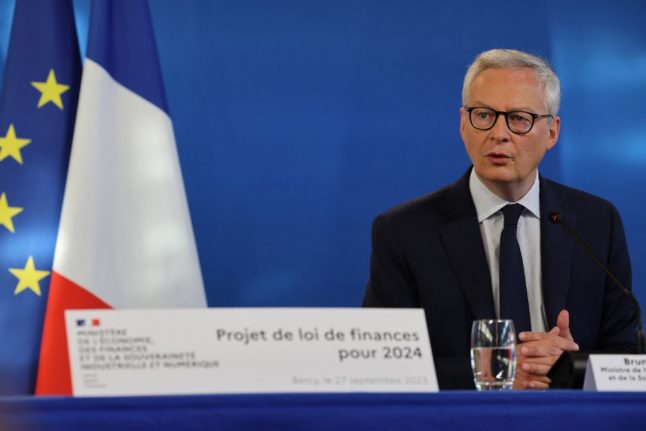“This budget is the first step towards improving the trajectory of our public finances,” said French Economy Minister Bruno Le Maire, presenting the government’s new budget plan to the Council of Ministers and the press on Wednesday.
The government hopes to reduce the public deficit to 4.4 percent of GDP next year by making €16 billion in “savings”; while simultaneously protecting households from rampant inflation.
In theory the government can push this budget through even without the consent of the National Assembly and Senate using the controversial 49.3 tool. Ministers suggested on Wednesday they may resort to this method of bypassing parliament to get the budget through.
Here is what the government announced and how it could affect you:
Protecting consumers from inflation
In order to protect purchasing power amid the cost of living crisis, the government plans to spend an extra €25 billion to tie pension pay-outs and social benefit payments to inflation. State pension payments are to increase by 5.2 percent from January 1st and social benefit payments for the poorest households known as minima sociaux will increase by 4.6 percent from April 1st.
If you receive a state pension or social security payments, this is good news for you.
Le Maire also said that the fuel cheque recently announced by President Emmanuel Macron will be delivered to some 4.3 million people.
READ MORE: Who could benefit from France’s planned new fuel subsidy?
The government is however set to progressively phase out price freezes on electricity by the end of 2024, which is where the bulk of the €16 billion in savings will come from.
Income bracket changes
The income thresholds that determine what income tax bracket you are in will increase by 4.8% at a projected cost of €6 billion to the public finances.
This means:
- If you earned less than €11,294 in 2023, you will pay 0 percent in income tax in 2024
- If you earned between €11,295 and €28,797 in 2023, you will pay 11 percent in income tax in 2024
- If you earned between €28,798 and €82,341 in 2023, you will pay 30 percent in income tax in 2024
- If you earned between €82,343 and €177,106 in 2023, you will pay 41 percent in income tax in 2024
- If you earned more than €177,106 in 2023, you will pay 45 percent in income tax in 2024
Green investments
The new budget plans include €10 billion in green financing, including an increase of €1.6 billion to finance the MaPrimeRénov’ scheme, which provides financing to make homes more energy efficient. The scheme is only partially open to second-home owners.
READ MORE: French property renovation grants closed to second-home owners
The poorest 50 percent of households in France will also be able to benefit from a programme that leases electric cars for just €100 per month, although the process for accessing this scheme is not yet clear.
The ‘ecological bonus’ on electric cars will remain in place but the way it is calculated will change. In December the government is set to unveil a list detailing which electric cars will make buyers or long-term renters eligible to receive this grant. Currently, people buying or renting electric cars worth less than €47,000 and weighing less than 2.4 tonnes are eligible to receive the grant.
Zero percent interest loans extended but only for certain house buyers
The government plans to extend zero percent interest loans for people looking to get onto the housing ladder. But these loans will only be open to those looking to buy collective housing (habitat collectif) and those looking to buy in areas with a housing shortage (zones tendues).
READ MORE How to get a mortgage in France
Le Maire said he was also open to reducing tax on furnished tourist rentals from 71 percent to 50 percent. Although this policy doesn’t feature on the budget bill, he said the government would be open to listening to suggestions on such a measure.
New tax on airport and motorway concessions
The government said it would introduce a new tax on airports and motorways. This eventually could result in prices being driven up for flyers and drivers if concession holders pass the costs onto consumers.
Online consultations no longer valid for sick leave of more than three days
In a bid to cut down on days missed at work through illness, the government is changing the rules around how to get a long arrêt de maladie – or sick note. Online consultations, known in France as téléconsultations, will now only be valid for a three-day exemption from work. Continued paid time off will require patients to visit a medical professional for a physical examination.
The French Health Minister said money paid out to ‘sick’ workers increased by 7.7 percent from 2022 to 2023. “It is not sustainable for our social model,” he said.
The new rules would come into effect next year.
More than 8,000 civil servants to be employed
The total number of civil servants employed in France is set to increase by 8273 in 2024. This includes 2681 new roles with the Interior Ministry and 1961 new roles with the Justice Ministry. This could increase police presence on the street and speed up the workings of French courts.
The budget assigned to schools will increase by €3.9 billion, which will largely go towards increasing teachers’ salaries. This could result in fewer strike days.



 Please whitelist us to continue reading.
Please whitelist us to continue reading.
Member comments